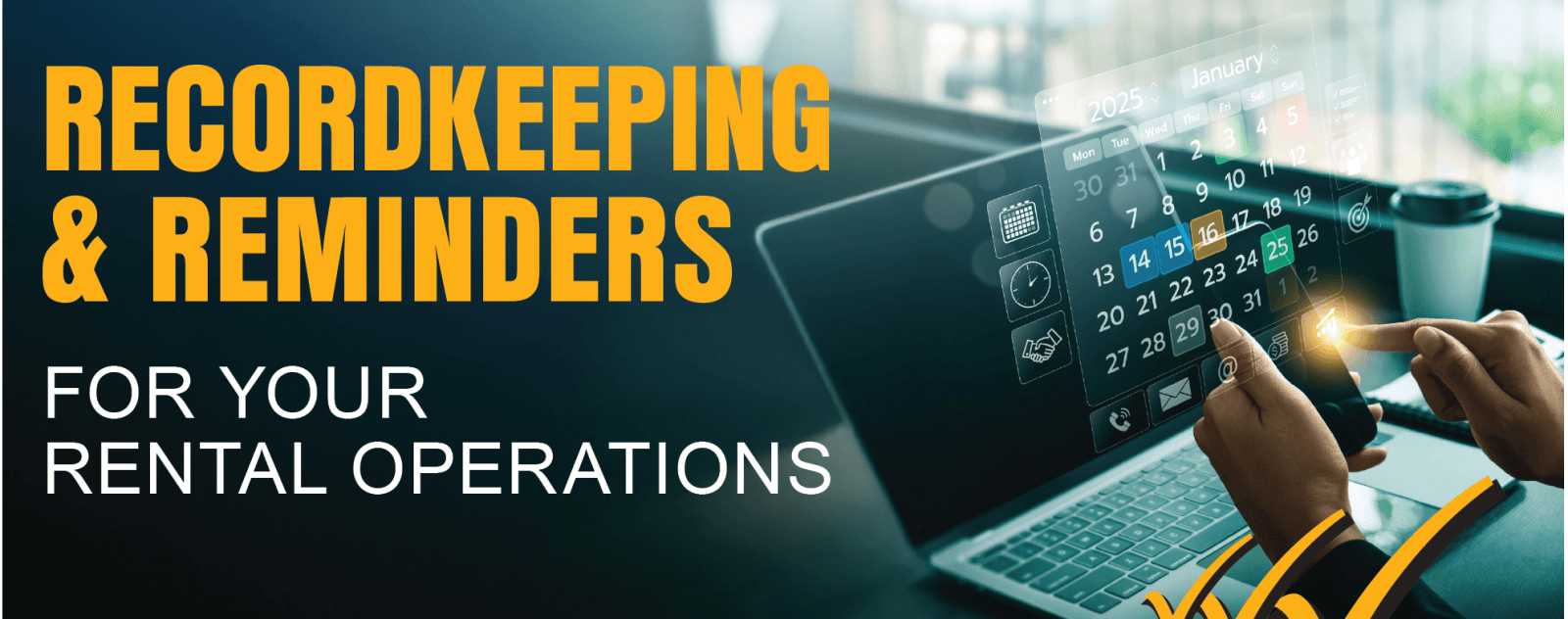RECORDKEEPING & REMINDERS FOR YOUR RENTAL OPERATIONS

Effectively managing your rental property starts with meticulous organization and proactive planning. By adopting professional systems and using RHAWA resources, you ensure compliance, avoid costly mistakes, and provide the highest level of service to your tenants.
A structured system is the backbone of professional property management. Keeping thorough, accessible records ensures you’re always prepared and helps avoid legal or operational oversights.
LEDGERS
If you do not use rental management software, simply create digital spreadsheets (using Microsoft Excel, Apple Numbers, or Google Sheets) to log essential details for each tenant and property.
For each tenant, keep track of:
- Property address
- Tenant name(s)
- Lease start and end dates
- Rent amount
- Security deposit amount
- Notice deadlines (e.g., rent increases, non-renewals)
- Inspection reminders (annual at mid-term, move-in/move-out
- Emergency contacts
- Forwarding address
- Notes
For each property, keep track of:
- Maintenance schedule (HVAC service, gutter cleaning, appliance replacement)
- Insurance policy details (policy number, renewal dates)
- Mortgage information (if applicable)
- Vendor information
- Notes (specific property)
FOLDERS FOR DOCUMENTATION
Supplement data with documents (digital scans and/or hard copies) containing:
For each tenant:
- Signed lease agreement
- Tenant application
- Move-in/move-out inspection reports
- Correspondence with tenants (repair requests, other issues, emails, letters)
For each property:
- Maintenance records (estimates, work orders, invoices, etc.)
- Insurance documents
- Property tax records
- Any other property-specific documentation
Using both digital and physical systems ensures redundancy and easy access whenever needed
SET UP CALENDAR REMINDERS
Relying solely on memory to track important dates is a recipe for disaster, especially now with different cities requiring longer rent increase notice periods. Calendar reminders keep your management proactive and stress-free.
- Digital Calendar (Outlook, Apple iCal, Google Calendar, smartphone app):
- Choose a digital calendar platform you regularly use.
- Schedule reminders for:
○ Lease renewal windows
○ Rent increase deadlines
○ Inspection schedules
○ Routine maintenance tasks (e.g., seasonal servicing)
○ Bill payment deadlines (taxes, insurance, mortgages)
○ Legal compliance updates and policy changes
RECORD RETENTION POLICY
It is important to have and follow a retention policy for saving documents and other records related to your rental business, especially tenant files. If you save things forever, it just means unnecessary work for you when faced with some kind of legal action that requires you to produce records. If you do not save things consistently or long enough, it may cause you to lose an important legal battle. So, how long should you save your records?
There are various reasons to keep files, and each has an associated retention recommendation from one to seven years. You can determine a different retention period for each type of file, or a simple approach is to keep all records for the longest recommended period, which for most landlords would be seven years.
- Criminal charges: Based on the type of crime, one to three years, or no limitation for filing.
- Civil penalties: Three years’ limitation for filing most civil crimes, defamation is two years, and debt collection is six years.
- Fair Housing: Complaints can be filed up to one year from the incident to the Washington State office, or up to two years to the Federal HUD office.
- Insurance: Claim limitation is generally six years.
- Taxes: The IRS recommends three to seven years based on various circumstances.
It’s a good idea to get recommendations from your lawyer, CPA, and insurance agent. Whatever you decide, just make sure to have your policy in writing and make sure you follow it consistently. When it’s time to get rid of files, they must be handled securely. You can shred them yourself or contact a trusted company that provides pickup and shredding services. For digital files, simply delete and then “empty” the trash or deleted folder. Do the same with any backup storage area.
TECHNICAL TIPS:
- Most calendar applications can set “recurring” appointments, such as the 1st of every month, or the fourth Monday of every month, or every other Monday, etc.
- In most spreadsheet applications, you can set up “Conditional Formatting” on a column to automatically highlight any date that is, for example, in the next week. This could be another way to flag upcoming important dates if you have too many properties to handle with individual calendar reminders.
- Both iCloud and Google Drive provide free cloud storage. Keeping your records in the cloud makes them accessible from anywhere with your login credentials.
Formal legal advice and review is recommended prior to selection and use of this information. RHAWA does not represent your selection or execution of this information as appropriate for your specific circumstance. The material contained and represented herein, although obtained from reliable sources, is not considered legal advice or to be used as a substitution for legal counsel.

